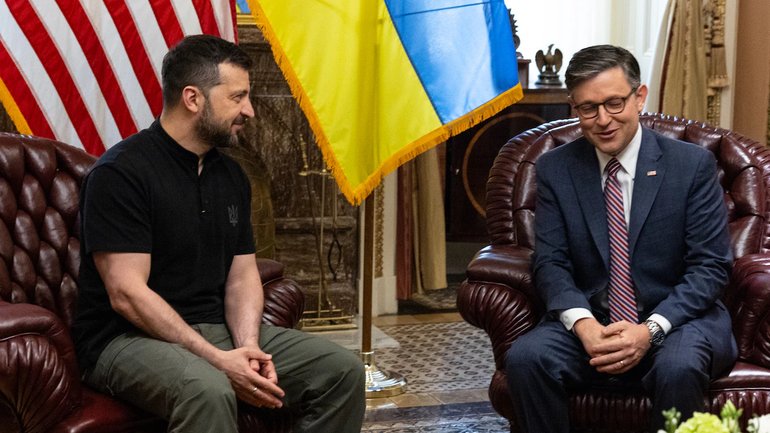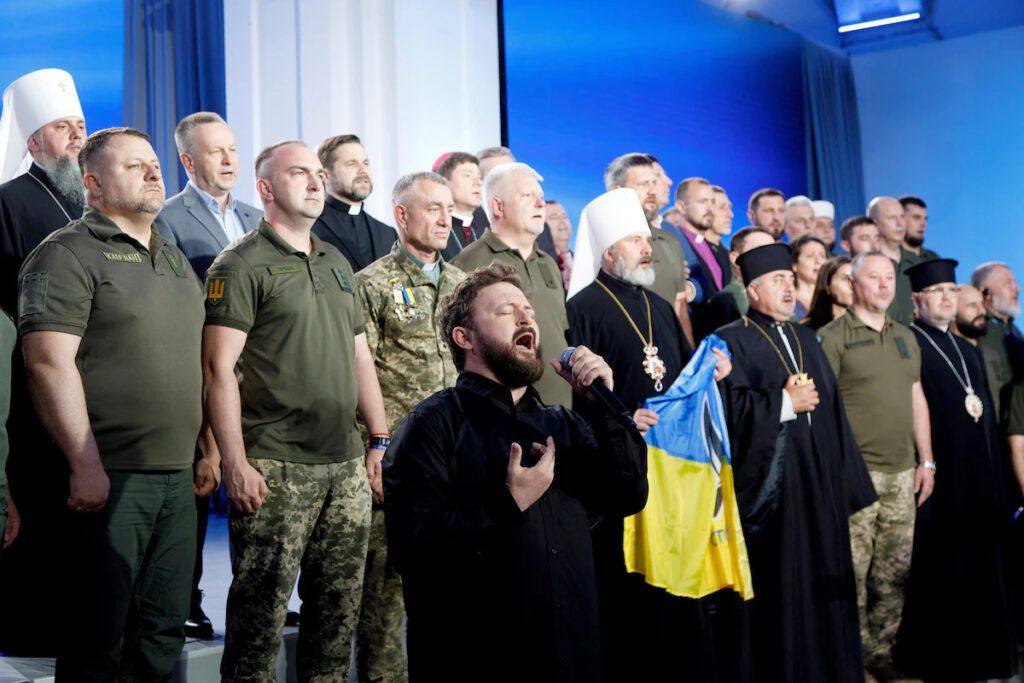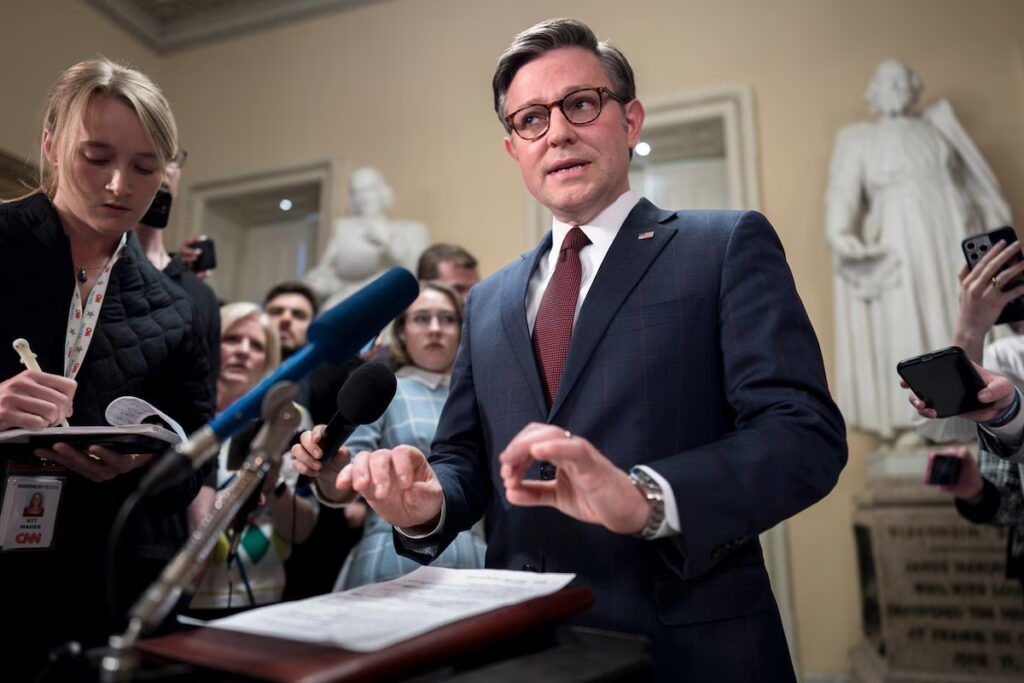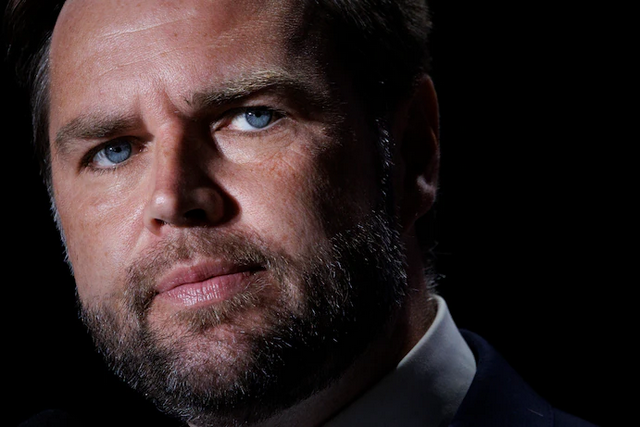As Trump looms, Ukraine turns to its evangelicals to woo the Republicans

By David L. Stern
In June, some 800 political and religious leaders gathered in a refurbished 19th-century armory in central Kyiv for the annual National Prayer Breakfast — an event borrowed from the American political calendar, that normally fails to attract top political names despite being more than a decade old.
This year was different, however. President Volodymyr Zelensky himself took part — the first time for a Ukrainian head of state — while U.S. Speaker of the House Mike Johnson and former vice president Mike Pence sent video messages that were aired at the event, which is organized by Ukraine’s evangelical Christians.
“Though one may be overpowered, two can defend themselves. A cord of three strands is not quickly broken,” Zelensky said, quoting the Book of Ecclesiastes [4:12] in his call for Ukrainian unity.
His attendance at the prayer breakfast demonstrated the growing realization among Ukraine’s leaders of the need to forge close ties with the country’s evangelical Christians, who number between 800,000 and 1 million. The government is betting that its own evangelicals can be a bridge to their counterparts in the United States, who are influential in the Republican Party and could assist in their lobbying efforts for more aid.
This outreach could prove crucial in the coming months, as Ukrainian officials lobby for additional American aid to thwart Russian advances and try to blunt anti-Ukrainian narratives within the Republican Party.
Officials say that the work of their evangelicals building ties with Republican leaders and voters is crucial — although they emphasize that the evangelicals also reach out to Democrats.
“You can call this synergy — they advocate what’s important to them, which is also important to us,” said one Ukrainian official, who spoke on the condition of anonymity since he wasn’t authorized to speak to the press. “They really, really help us.”
This assistance will definitely come in handy in case of a victory by Donald Trump and his Kyiv-critical running mate Sen. JD Vance (Ohio), the official added. “But even if he doesn’t win, the Republicans will have a significant number of people in Congress.”
Vance said in a podcast in 2022 that “I don’t really care what happens to Ukraine one way or the other.”
Ukrainian officials estimate their country has the largest population of evangelicals in Europe. “Ukraine is the ‘Bible Belt’ of Eastern Europe,” Ukrainian presidential adviser Andriy Yermak wrote in the American media outlet the Hill in April. Their numbers exploded in the wake of the religious vacuum that emerged after the Soviet Union’s fall.
In the United States, it’s an important community for the Republican Party, with exit polls in the 2016 and 2020 elections indicating that between 37 percent and 46 percent of Trump voters identified as White evangelical Christians, with Johnson and Pence among its more prominent members. In 2020, 76 percent of White evangelicals voted for Trump.

Pavlo Unguryan, a Ukrainian evangelical minister and community leader who helped start the prayer breakfast, explained that his church plays an important role outside the country, “especially for, let’s say, quiet diplomacy and unofficial diplomacy.”
This unofficial diplomacy served Ukraine well at the beginning of the year when a coalition of political and civil society actors — in which Ukrainian evangelicals played a significant role — helped overcome Republican opposition to provide Ukraine with $61 billion in desperately needed military assistance.
Johnson’s speech at the June prayer breakfast marked his continuing evolution on the subject of support for Ukraine, going from opposing military aid to becoming one of its staunchest allies.
“We pray for the continued strength of the Ukrainian forces, the safety of the Ukrainian people and lasting peace in your homeland,” Johnson said in his video remarks at the event in Kyiv.
Unguryan was a part of a group of evangelicals who met with Johnson and other members of Congress several times to press for the aid package, before it was approved in April, though he disputes that he changed the congressman’s mind but rather “brought him the truth.”
The week before the vote, Unguryan helped set up a meeting between Johnson and Serhii Haidarzhy, an evangelical whose wife, Anna, and 4-month-old son, Tymofii, died the month before in a drone attack in Odessa. The meeting was “very emotional,” Unguryan said.

Steven Moore, an American Christian who heads the Ukraine Freedom Project — an U.S.-based group helping Ukrainian evangelicals reach out to American political and religious leaders — believes that two factors were key in changing Johnson’s mind: the intelligence briefings he received, which starkly illustrated the Russian threat, and the meetings with Ukrainians.
The intelligence briefings gave Johnson “the intellectual information, why supporting Ukraine was in the interest of the United States,” Moore said. “And then we were able to give him the emotional and spiritual connection that helped sway him in that regard.”
The project also conducted targeted ad campaigns, focusing on Johnson’s top 1,000 donors and using religious messaging, and helped devise a plan to buy space on a billboard directly across from Johnson’s church in Benton, La.
The billboard showed a church that had been bombed by Russian forces in Ukraine, and directly addressed Johnson with a verse from the Book of Esther, “For such a time as this” — a favorite of Johnson’s that spoke of rising to meet the challenges of the moment, Moore said.
But there remains a significant portion of Republicans, such as Vance, who remain opposed to supporting Ukraine financially and militarily. Their opposition is fueled in part by Russian-inspired narratives, pushed in conservative media, that Ukraine is persecuting its Christian community and that Russia is a country of traditional Christian values.
“Russia has invested enormous resources to create this image,” Unguryan said. “But this is a fake image, it is not true.”
The reality is the exact opposite, Unguryan and others say: In the areas of Ukraine that Russian forces currently occupy, Christian denominations independent of the Russian Orthodox Church are being closed down and oppressed, including Catholics, members of Ukraine’s own Orthodox Church, as well as Evangelicals.

In the past two years, 30 Ukrainian clergymen have been killed and 26 have been taken captive by the Russians, the U.S. State Department’s Office of International Religious Freedom said in February.
Ukraine’s critics, however, can point to the law passed in August that could close down a branch of the Russian-aligned Orthodox Church in Ukraine. The bill’s proponents say that the law is aimed at eliminating Russian influence in Ukraine — which in some cases involves collaboration with Moscow’s forces — and merely begins a process that could take years.
Regardless, evangelicals maintain that Ukraine, in contrast to Russia, is a country that guarantees freedom of conscience. Russia resembles more the old Soviet Union, they say, where they were forced to pray in secret or face persecution.
For Ukrainian and American evangelicals, the key to defeating these narratives in the United States is to reach out directly to evangelical communities, meet with pastors and congregations, appear on local media outlets and just tell the truth.
Unguryan — on his own and with groups like the Council of Evangelical Churches of Ukraine — has been engaging his American counterparts for years and has an extensive Rolodex of political and religious contacts from a variety of denominations to show for this. In July, he was also the sole Ukrainian evangelical to attend the Republican National Convention.
“Last year we were in Arkansas, Texas, Arizona, Louisiana, Alabama, Florida, Georgia, Tennessee, South Carolina, North Carolina, Ohio and Pennsylvania,” he said.
Other Ukrainians have also recognized the impact of the evangelical message, which they hope to increase in the coming months. In February, the Kyiv School of Economics — through a nonprofit organization Kyiv Global Outreach — contracted the Washington lobbying firm DCI Group for $3.6 million, largely to share the Ukrainian evangelicals’ stories with the American evangelical audience.
“With conservative Republicans, this is the power,” said Gary Marx, a prominent American evangelical who heads the DCI project.
Ultimately, the evangelicals, Ukrainian and American alike, hope they can change Vance’s stance on Ukraine, much as they did with Johnson. Vance, a devout Catholic, could be swayed by stories of the persecution of the Greek Catholic Church in the Russian occupied territories.
>“Some people in our team are in contact with some people in his — we’re in the process,” said Unguryan.
Catherine Belton in London contributed to this report.









